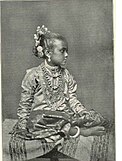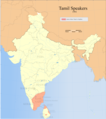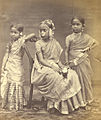The Tamils portal
The Tamils (/ˈtæmɪlz, ˈtɑː-/ TAM-ilz, TAHM-), also known as the Tamilar, are a Dravidian ethnolinguistic group who natively speak the Tamil language and trace their ancestry mainly to India's southern state of Tamil Nadu, to the union territory of Puducherry, and to Sri Lanka. The Tamil language is one of the world's longest-surviving classical languages, with over 2000 years of Tamil literature, including the Sangam poems, which were composed between 300 BCE and 300 CE.
Tamils constitute 5.9% of the population in India (concentrated mainly in Tamil Nadu and Puducherry), 15% in Sri Lanka (excluding Eelam Moors), 7% in Malaysia, and 5% in Singapore. From the 4th century BCE, urbanisation and mercantile activity along the western and eastern coasts of Tamilakam -- what is today Kerala and Tamil Nadu -- led to the development of four large Tamil empires, the Cheras, Cholas, Pandyas, Pallavas, and velirs and a number of smaller states, all of whom were warring amongst themselves for dominance. The Jaffna Kingdom, and vanni chieftaincies inhabited by Eelam Tamils, was once one of the strongest kingdoms of Sri Lanka and controlled much of the north of the island. (Full article...) Selected article -The Portuguese conquest of the Jaffna kingdom occurred after Portuguese traders arrived at the rival Kotte kingdom in the southwest of modern Sri Lanka in 1505. Many kings of Jaffna, such as Cankili I, initially confronted the Portuguese in their attempts at converting the locals to Roman Catholicism, but eventually made peace with them. By 1591, the king of Jaffna Ethirimanna Cinkam was installed by the Portuguese. Although he was nominally a client, he resisted missionary activities and helped the interior Kandyan kingdom in its quest to get military help from South India. Eventually, a usurper named Cankili II resisted Portuguese overlordship only to find himself ousted and hanged by Phillippe de Oliveira in 1619. The subsequent rule by the Portuguese saw the population convert to Roman Catholicism. The population also decreased due to excessive taxation, as most people fled the core areas of the former kingdom. (Full article...)General imagesSelected biography -
Veerapandiya Kattabomman was an 18th-century Palayakarrar and king of Panchalankurichi in Tamil Nadu, India. He fought the British East India Company and was captured by the British with the help of the ruler of the kingdom of Pudukottai, Vijaya Raghunatha Tondaiman, and at the age of 39 he was hanged at Kayathar on 16 October 1799. (Full article...)
CategoriesTopicsTamil People Countrywide: India • Sri Lanka • Canada • Malaysia • Singapore • South Africa • England Related Ethnic Groups: Brahui • Gond • Kannadiga • Khonds • Kodava • Oraon • Malayali • Telugus • Tuluvas Related indigenous Groups: Badagas • Toda • Kuruba
See also: List of Tamil people, Tamil script, Tamil Script Code for Information Interchange Related portalsWikiProjectsThings to do
Associated WikimediaThe following Wikimedia Foundation sister projects provide more on this subject:
Discover Wikipedia using portals |






























































